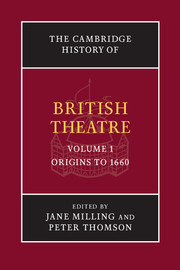Book contents
- Frontmatter
- PART I PRE-ELIZABETHAN THEATRE
- PART II ELIZABETHAN THEATRE
- 5 The development of a professional theatre, 1540–1660
- 6 Drama outside London after 1540
- 7 ‘An example of courtesy and liberality’: great households and performance
- 8 The birth of an industry
- 9 Theatre and controversy, 1572–1603
- 10 The condition of theatre in England in 1599
- 11 Ben Jonson's Every Man in his Humour: a Case Study
- 12 London professional playhouses and performances
- PART III JACOBEAN AND CAROLINE THEATRE
- Works Cited
- Index
- References
10 - The condition of theatre in England in 1599
from PART II - ELIZABETHAN THEATRE
Published online by Cambridge University Press: 28 March 2008
- Frontmatter
- PART I PRE-ELIZABETHAN THEATRE
- PART II ELIZABETHAN THEATRE
- 5 The development of a professional theatre, 1540–1660
- 6 Drama outside London after 1540
- 7 ‘An example of courtesy and liberality’: great households and performance
- 8 The birth of an industry
- 9 Theatre and controversy, 1572–1603
- 10 The condition of theatre in England in 1599
- 11 Ben Jonson's Every Man in his Humour: a Case Study
- 12 London professional playhouses and performances
- PART III JACOBEAN AND CAROLINE THEATRE
- Works Cited
- Index
- References
Summary
England in 1599
It was not a good year for facing the future with confidence. Seven successive bad harvests with their effect on prices and human well-being, a long war against Spain fought across the North Sea in the Netherlands, threatening more Armadas and draining the government's treasury, the major distraction of a new and costly rebellion in Ireland, a virgin queen now long past the hope of bearing any heir and so prompting fears of a disputed succession, all these troubles, along with the recurrent epidemics of bubonic plague, made the Bible's four horsemen of the apocalypse into an ominous symbol of life's realities as the new century loomed. Famine, war, pestilence and death were on show throughout the country.
Probably the largest fear was over the succession. With Catholics oppressed more and more by the church establishment, and getting active support from the Spanish enemy, the danger that civil war would return whenever the sixty three-year-old Elizabeth died was a constant concern. The Catholics had a case, and a candidate. Elizabeth's elder half-sister Mary, whom she succeeded, had married Philip of Spain. Mary died without bearing any heirs, but her marriage gave her husband an interest in the English throne that he tried to enforce in 1588 with his Armada. English Catholics who kept the old faith had reason to assert Elizabeth's bastardy and her dubious claim to the throne. The pope had given them even more dangerous arguments.
- Type
- Chapter
- Information
- The Cambridge History of British Theatre , pp. 264 - 281Publisher: Cambridge University PressPrint publication year: 2004



